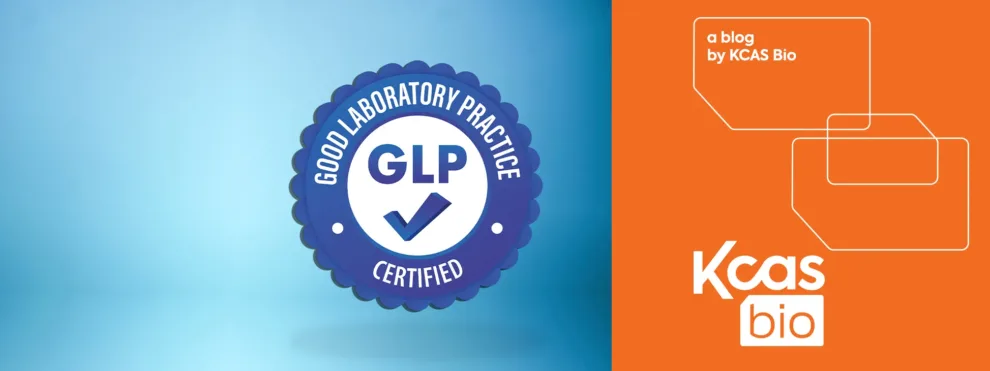The Importance of GLP Compliance Certificate for Bioanalytical CROs
We are proud to celebrate the one-year anniversary of our Good Laboratory Practice (GLP) Test Facility based in Lyon (France), dedicated to providing GLP-grade bioanalytical methods for preclinical toxicology studies. Since achieving “A compliance status” in November 2023, our facility has been optimally prepared to support investigational new drug (IND)-enabling studies. This milestone not only highlights KCAS Bio’s commitment to quality and excellence but also adds significant value for our clients to meet the growing demand for bioanalytical testing services.
Why a GLP Compliance Certificate Matters ?
Introduced almost 50 years ago (late 1970s) to prevent scientific fraud, GLP is both a forgery-proof and legally-binding standards for regulatory studies. GLP compliance is not just a regulatory requirement; it is a critical standard that ensures the quality, reliability, and integrity of the results produced by laboratories. Originally established in 1978 by OECD (Organization for Economic Co-operation and Development) experts, these principles were subsequently incorporated into French law for medicinal products for human use through the decree of March 14, 2000 (“Arrêté du 14 mars 2000 relatif aux bonnes pratiques de laboratoire”).
Our facility was recognized as GLP compliant by the French health authorities according to this decree, and we adhere to the data integrity recommendations outlined in the OECD’s 2021 guidelines. These guidelines emphasize a risk-based approach to data management, focusing on data risk, criticality, and lifecycle.
This commitment to quality ensures that our results meet the highest standards, facilitating international acceptance and recognition of our studies.
Quality Assurance: A Cornerstone of GLP
A robust Quality Assurance (QA) program is essential for maintaining GLP compliance within any test facility/site. QA serves as an internal mechanism for continuous monitoring, ensuring that test facility (site) management (TFM/TSM) effectively oversees both the facility/site and the studies or phases conducted. This proactive approach means that our clients can trust that their data will withstand scrutiny during customer audits and regulatory inspections from international health authorities.
Our QA processes incorporate a risk-based management approach, ensuring that any potential issues are anticipated and addressed promptly. By maintaining a state-of-the-art QA Management System, we bring transparency and trust to satisfy our pharma-industry customers.
Global Recognition and Mutual Acceptance of Data
One of the key benefits of GLP compliance is its global recognition. Studies conducted in GLP-compliant facilities are accepted in other countries, thanks to Mutual Recognition Agreements (MRAs)1 and – Mutual Acceptance of Data (MAD)2 within the European Union and among OECD member countries. This means that data generated in our Lyon facility is not only valid in Europe but also recognized by international regulatory bodies.
Despite slight variations in requirements between regions—particularly in terminology—GLP principles remain consistent in their goal: ensuring that the data generated is of sufficient quality and integrity for its intended use. This standardization facilitates smoother regulatory processes and enhances the credibility of research results generated within the framework of each program.
Staying Ahead of Regulatory Changes
The landscape of GLP compliance is continually evolving, guided by new OECD recommendations and guidelines. By keeping abreast of these changes, we ensure that our practices remain cutting-edge, aligning with the latest standards in quality improvement. Our commitment to GLP compliance certificate is an ongoing journey, and we are dedicated to maintaining our facility’s compliance to exceed customer expectations and satisfaction.
With the opening of our new GLP Test Facility/site, we are excited to enhance our ability to support clients throughout the entire lifecycle of therapeutic development— from early discovery studies, GLP tox studies up to late-phase clinical trials. This facility not only expands our bioanalytical capabilities but also strengthens our commitment to delivering reliable, high-quality data at every stage of the research process.
For KCAS Bio’s clients, this means access to scientifically rigorous data that is crucial for the successful development and regulatory approval of new therapeutic entities. We remain dedicated to providing the highest standards of quality and excellence to help bring innovative therapies to market efficiently and safely.
- Correia de Brito, A., C. Kauffmann and J. Pelkmans (2016), “The contribution of mutual recognition to international regulatory co-operation”, OECD Regulatory Policy Working Papers, No. 2, OECD Publishing, Paris
- https://www.oecd.org/content/dam/oecd/en/topics/policy-sub-issues/testing-of-chemicals/national-glp-compliance-monitoring-programmes-which-participate-in-the-mutual-acceptance-of-data.pdf
If you have any questions about these services or any others offered by KCAS Bio, please use the form below. Thank you!

